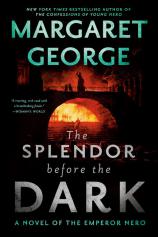Reading Group Guide
Discussion Questions
The Splendor Before the Dark: A Novel of the Emperor Nero

1. Nero is forever linked with the Great Fire of Rome. The rumors that it was his fault started immediately afterward. Why do you think people blamed him for it?
2. Others blamed the Christians for the Fire. Do you think those accusations were justified, given what people knew at the time?
3. Many of Nero’s grand engineering projects, particularly the Golden House, seemed to glorify his own stature and be for his own enjoyment. Do you think he was a visionary genius or an egotist oblivious to public opinion?
4. Nero had a relationship with Sol, also known as Apollo. He repeatedly refers to that relationship in the imagery of his buildings --- in the Golden House, the Golden Day with Tiridates, the reverence for Apollo, the bronze colossus --- in an ancient form of image branding. Do you think he was successful in capturing the popular imagination and aligning himself with the sun god in people’s eyes?
5. One of the themes of the book is the three Neros --- the daylight, dutiful emperor; the artist; and the dark one who is capable of murder. Could any one of them exist without the other two? Is one of them the real Nero? Which one?
6. Locusta is an honorable person but also a poisoner for hire. Is it possible to be both in the world of first-century Rome?
7. Nero is continually haunted by the ghost of Agrippina, his mother. In what ways do you see that having affected his actions in his everyday life?
8. The historian Bernard Henderson has said that the first conspiracy that attempted to bring Nero down had sorry motives and was driven by petty people. There were three main groups with differing gripes: the military, who felt that the emperor was undignified and demeaned the office; the aristocrats and senators, who resented his ignoring them and favoring the common people; and a variety of people with personal vendettas, who were mostly individuals who felt slighted or jealous. Was Nero justified in feeling that only divine protection had saved him at the eleventh hour? If not, what do you feel did save him?
9. Nero’s literary group was his attempt to have a circle of like-minded friends, free of politics. Why do you think the people in that group betrayed him? Do you think their betrayal was the most hurtful?
10. Seneca, Nero’s boyhood tutor, is held in high esteem in some quarters as a moral philosopher and by others as a hypocrite who excused Nero’s crimes and even profited from them. What is your judgment of him? Do you think he was truly a party to the conspiracy or was he framed?
11. How did that first conspiracy against Nero change him, as an emperor and as a man?
12. Do you think Nero was actually a good artist? Do you think all the praise he received was false and the contests he won were rigged? Could he ever get a fair judgment of his performance?
13. Did seeing Nero as a competitor and watching his interactions with others in Greece influence your perception of him? Did it make you respect him more or less?
14. The reception of Tiridates and the ceremony of closing the doors of the Temple of Janus to celebrate peace in the empire were great events in Nero’s life. Do you think such things were important to the Romans? Why do you think historians have given Nero so little credit for his important diplomatic victories?
15. Nero had four serious relationships with women --- five if you count his mother. The first, the arranged marriage with Octavia when he was 15, was devoid of attachment on either side. The second, his mistress Acte, was romantic and idealistic. The third, his marriage to Poppaea, was erotic passion. The fourth, his marriage to Statilia, was companionate. Which do you think was best for him?
16. Nero’s faithful mistress Acte is a main character in his life. How would you describe their relationship? Why was she so loyal to him?
17. Who was the dominant one in the relationship between Poppaea and Nero?
18. Was Nero’s relationship with Sporus, the artificial Poppaea, simply a neurotic grief reaction? Or was it even more complicated than that? Why do you think he was able to find sexual satisfaction in it?
19. The oracle at Delphi was known for giving misleading answers. If you were Nero, would you have consulted her?
20. Why was it so important to Nero to go to Greece? Was Nero a modern man in the sense that he put self-realization and personal freedom as his highest value? Or was he simply self-centered and naive?
21. Do you think going to Greece led to his ultimate downfall? If so, was it because of his long absence? Or his perceived frivolity?
22. Do you think the trip to Greece had more to do with his downfall than his lack of attention to the military? Or was it primarily caused by a betrayal?
23. Ultimately, do you think he overreacted to events with panic and despair? If so, why do you think he was susceptible at that moment in his life?
24. Was Nero’s death ultimately avoidable?
25. What do you make of the fact that people kept putting flowers on Nero’s tomb and that three Nero imposters appeared over a 20-year period and gathered followers?
26. Suetonius said that Nero’s leading character trait was a longing for immortality and undying fame. Do you think he succeeded in achieving that? Do you think he would be happy about how he is remembered?
27. Was Nero a good emperor or a bad one? Would the answers of his contemporaries depend on whether they were aristocrats or commoners?
The Splendor Before the Dark: A Novel of the Emperor Nero
- Publication Date: October 8, 2019
- Genres: Fiction, Historical Fiction
- Paperback: 592 pages
- Publisher: Berkley
- ISBN-10: 0399584625
- ISBN-13: 9780399584626







